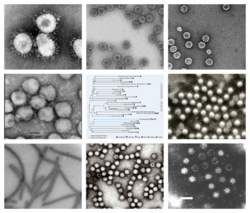Biology:Pisuviricota
From HandWiki
Short description: Phylum of viruses
| Pisuviricota | |
|---|---|

| |
| Clockwise from top left: TEM of avian coronavirus, Penicillium stoloniferum virus S, picobirnavirus, polio virus, calicivirus, astrovirus, plum pox virus, Nam Dinh virus. Center: phylogenetic tree of phylum Pisuviricota | |
| Virus classification | |
| (unranked): | Virus |
| Realm: | Riboviria |
| Kingdom: | Orthornavirae |
| Phylum: | Pisuviricota |
Pisuviricota is a phylum of RNA viruses that includes all positive-strand and double-stranded RNA viruses that infect eukaryotes and are not members of the phylum Kitrinoviricota, Lenarviricota or Duplornaviricota.[1] The name of the group is a syllabic abbreviation of “picornavirus supergroup” with the suffix -viricota, indicating a virus phylum.[2] Phylogenetic analyses suggest that Birnaviridae and Permutotetraviridae, both currently unassigned to a phylum in Orthornavirae, also belong to this phylum and that both are sister groups.[3] Another proposed family of the phylum is unassigned Polymycoviridae in Riboviria.[4]
Classes
The following classes are recognized:
- Duplopiviricetes
- Pisoniviricetes
- Stelpaviricetes
References
- ↑ "Virus Taxonomy: 2019 Release". International Committee on Taxonomy of Viruses. https://ictv.global/taxonomy.
- ↑ Koonin EV, Dolja VV, Krupovic M, Varsani A, Wolf YI, Yutin N, Zerbini M, Kuhn JH. "Proposal: Create a megataxonomic framework, filling all principal taxonomic ranks, for realm Riboviria" (in en). https://ictv.global/taxonomy/taxondetails?taxnode_id=201907209.
- ↑ "Doubling of the known set of RNA viruses by metagenomic analysis of an aquatic virome". Nature Microbiology 5 (10): 1262–1270. 20 July 2020. doi:10.1038/s41564-020-0755-4. PMID 32690954.
- ↑ Suvi Sutela, Anna Poimala, Eeva J Vainio (2019). Viruses of fungi and oomycetes in the soil environment. Oxford Academic.
Wikidata ☰ Q92194811 entry
 |


